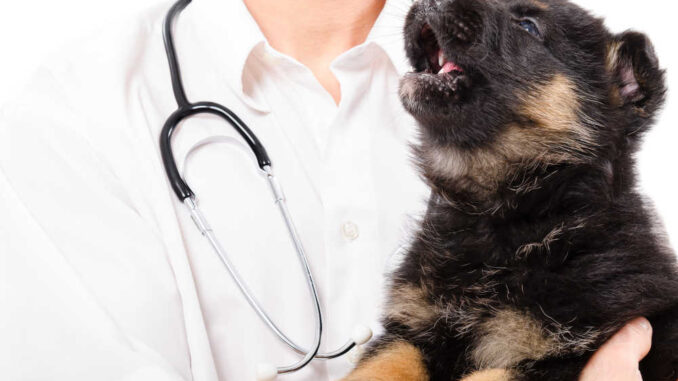
This article was updated on March 15th, 2024

A common issue after a dog’s surgery is excessive crying or whining. As a veterinary surgeon, I have treated hundreds of dogs after their surgeries and have seen many owners talking about this issue. In this article, I’ll discuss the most common causes and share 7 easy tips to help.
After surgery, a dog may whine due to pain, feeling cold, or anxiety.
Dogs often whine or cry after a surgery, even when pain medication has been correctly administered. While it may seem like your surgeon has done something wrong, this is generally not the case. A dog crying is often an indication that they are in pain or feeling cold, both of which can occur after a surgical operation as a result of the anesthetic drugs.
Anxiety following surgery can also make a dog whine as they are trying to communicate their distress. After any sort of surgery, it is not unusual for pets to display some discomfort or anxiety. A dog might exhibit signs of anxiety such as whining, restlessness, or pacing. Whining is a common side effect due to the shock of the procedure and the healing process that follows.
Most dogs recover without any major issues and typically stop whining within a couple of days.
This whining should be temporary and usually diminishes as your dog recovers. However, if the behavior continues beyond a couple of days or gets worse over time, you may want to contact your veterinarian for further examination. Dr. Whittenburg recommends the following:
“If your dog is screaming out, is distressed, or seems to be in pain, contact your veterinarian or take them to the nearest emergency hospital.”
Not all whining is the same – be sure that your dog doesn’t seem distressed or in pain above and beyond what would be expected for recovery. If this is the case, don’t wait – contact your vet right away. If you notice that your pup’s whining isn’t diminishing or appears to be worsening days after the surgery, it’s important to check in with your vet.
Additionally, if your dog is showing other signs of discomfort or illness (besides the whining or crying), you should also reach out to your vet.
7 easy tips to help your dog
With the right approach, owners can help their dogs through this difficult time and significantly reduce vocalizing and whining with the following tips:
1. Of course, it’s essential to follow any post-operative instructions your vet has provided and to keep up with any prescribed pain medication. Make sure that you have given your dog the right dose of pain medication. Call your vet in case you have any doubt.
2. Giving your dog plenty of rest and restrict their activity for a period of time. Make sure they have a safe & quiet space to recover.
3. Provide comfortable bedding and familiar surroundings. Stick to your usual schedule and keep their favorite toys close by.
4. Ensure that there are no disturbances in the area during recovery.
5. If your dog’s body temperature is too low, it’s important to keep them warm. You can tell if your dog’s temperature is too low if they are shivering, have cold ears or a temperature below 99.5°F when measured with a thermometer.
6. Ensure that there is a sufficient amount of water and food available.
7. Taking the time to offer positive reinforcement with treats or verbal praise can make an immense difference in how your pet copes with pain after surgery.
“Sometimes, the best medicine for those post-operation blues is simple love and care! The most effective remedy may simply be to give your dog some extra attention with lots of snuggles and patience.”
Contact your vet if your dog’s whining continues beyond a few days or seems to be getting worse
Any change in vocalization (including crying or moaning) can be an indication that your dog is in pain. Your vet may be able to address this with different treatments or additional pain medication. You should also contact your vet if you notice other abnormal symptoms, such as:
- lethargy,
- vomiting, diarrhea, or
- loss of appetite
Being attentive to these signs is key, so if you have questions or worries about their recovery process, don’t hesitate to reach out to your veterinarian right away.
In addition, if it has been several weeks and medication changes don’t result in any decrease in whining, it may be caused by anxiety or discomfort stemming from the surgery that requires additional treatment beyond medications.
Other important tips for surgery aftercare
When it comes to surgery aftercare, there is more than just worrying about possible whining post-operation:
- Create a calm, comfortable atmosphere at home.
- Minimize the amount of activity to reduce the risk of injury or irritation.
- Keeping the diet consistent both before and after the surgery can help maintain energy levels and promote healing.
- Keep an eye on any incisions and stitches and watching for signs of infection: view pictures of normal incisions or pictures of incision infections.
- Make sure your dog has easy access to plenty of water bowls.
- Keep other pets and children away from your post-operative pet so they can rest and recover in peace.
Conclusion
As we have learned, a dog whining after surgery is common and relatively normal. Make sure that your dog doesn’t appear distressed or in pain beyond what would be expected during the recovery process. If this is the case, don’t wait – immediately contact your veterinarian.
In other cases, though, the most effective remedy may simply be to give your dog some extra TLC with lots of snuggles and patience. With these tips in mind and some quiet healing time at home, you can rest assured that your dog will fully recover from surgery without any long-term issues. Take your time and remember: sometimes, the best medicine for those post-op blues is simple love and care!
Common issues after surgery:
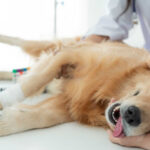
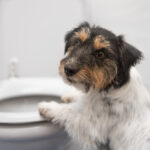


Disclaimer: This website's content is not a substitute for veterinary care. Always consult with your veterinarian for healthcare decisions. Read More.





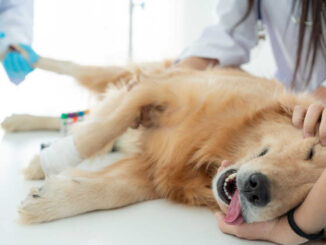
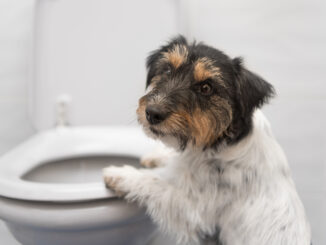
Be the first to comment